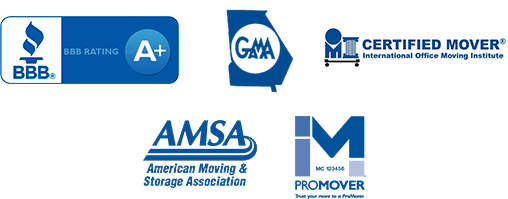Packing can make all the difference for a smooth and stress-free moving experience. We know boxing things up can be overwhelming, so we’re going to share specific packing tips to keep common household essentials safe.
We’ll start off by giving you a handy checklist of the best packing materials to protect your belongings.
Let’s get packing!
Planning and Preparation: Getting Ready to Pack Up
The size of your home will give you a general idea of how many boxes and other moving supplies you’ll need. If you live in a one-bedroom apartment and plan to pack up yourself, you’ll probably need around 30 sturdy boxes; in a four-bedroom house, plan on needing at least 120 boxes.
While recycled boxes may appeal, investing in new, quality packing materials is a better plan for keeping items damage free.
“Used boxes can contribute to damage because they often fail at the worst possible time,” says Glenn Usery, one of our experienced Atlanta metro moving specialists.
For self-packing our team recommends:
Boxes
- Small boxes for heavy items
- Medium boxes for general household items
- Large boxes for lightweight, bulky items
- Dish pack or glass pack boxes
- Wardrobe boxes for hanging clothes
Packing Materials
- Packing paper
- Bubble wrap
- Foam sheets
- Heavy-duty packing tape for sealing boxes
Labeling Supplies
- Permanent markers for labeling boxes
- Colored stickers or tape for color-coding boxes by room
- Pre-printed FRAGILE and HEAVY labels
Tools and Equipment
- Scissors
- Tape dispenser or tape gun
- Work gloves
Miscellaneous Items
- Zip-top bags for storing small items and hardware
- Twist ties or cable ties for organizing cords and cables
- Garbage bags or contractor bags for disposing of trash
Once you gather all your packing supplies, create a packing schedule that outlines the tasks you’ll need to complete in the weeks leading up to your move.
It’s best to start packing infrequently used items and gradually work your way towards daily essentials.
Before you begin packing, sort through your belongings and identify items that can be donated, sold, or discarded. This will streamline the packing process and save you time and money.
Basic Techniques for Stress Free Packing
Pack efficiently to make the most of the space within your boxes. Fill empty gaps with smaller items or packing materials like crumpled paper. You can even use towels, pillows, or blankets as packing materials to protect your belongings and save on packing supplies.
Any clothing you need to pack that can’t double as packing materials or remain in drawers can be moved in wardrobe boxes, rolled and placed in boxes, or stowed in suitcases using vacuum bags.
If you have furniture to disassemble, you can break down large pieces of furniture into smaller components for easier handling and transportation. Securely wrap and protect any disassembled parts using stretch wrap or furniture pads. Keep the connectors in a labeled zip top bag.
Always clearly label each box with its contents and the destination room. This makes the unpacking process more efficient. Indicating whether a box holds fragile items or is heavy helps to load the moving truck more efficiently and minimizes crush risk.
How to Protect Specific Household Items When Packing Up
Use dish packs or glass pack boxes for your kitchen items. These are specially designed to protect these items from damage. For other fragile items, wrap them individually in packing paper or bubble wrap, and place them in a sturdy box with ample padding.
Nest pots and pans together, placing packing paper or foam sheets between each piece to prevent scratches. Wrap the entire stack in paper or bubble wrap and secure it with packing tape.
Pack electronics in their original boxes if you still have them. Otherwise, use sturdy boxes with each device in bubble wrap to prevent damage from static electricity. Take a picture of wire configurations, label removable cords and cables or secure them with cable ties or rubber bands.
When packing lamps, remove the bulb, harp, and shade. Wrap each component separately in bubble wrap or packing paper. Large, sturdy boxes are perfect for lampshades. Use clean crumpled packing paper or soft materials to fill gaps and provide cushioning.
If you’re a book lover, pack books flat in small or medium-sized boxes to prevent spine damage. Avoid over packing boxes, as books get heavy. For valuable coffee table books, wrap them in packing paper or bubble wrap for extra protection. A move is also the perfect time to donate books to charity.
Moving Day: Items to Keep Close
There are a few essentials you’ll want to hold back from the moving truck. Pack a separate box of essential items you’ll need during the move, such as toiletries, clothes, important documents, medications, and chargers.
When possible, transport valuable items like jewelry with you.
Keep valuables and essentials separate from your other possessions so you always know their location.
Hire Professional Atlanta Area Movers Today
Using these expert packing tips can help you prepare for a seamless move in Atlanta, Georgia. Even with preparation a DIY move can be time-consuming and labor-intensive. For a stress-free move, consider hiring professional Atlanta movers who can handle every aspect of the packing, loading, and unpacking of your belongings.
When you choose Bulldog Movers for your home or apartment move, you’ll work with a company with over 40 years of experience. Our moving specialists ask the right questions and provide an accurate moving estimate, so you never receive surprise charges at the end of your move.
We have a fleet of clean, bright red GPS enabled moving trucks and a team of well-trained, professional movers who carefully handle every aspect of your move.
Call us today at (770) 679-8356 or fill out a quick quote request online.




















